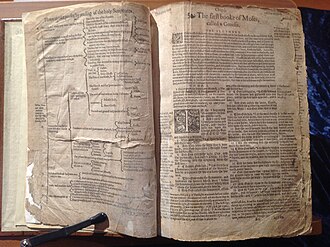John Calvin believed that Scripture is necessary for human understanding of God's revelation, that it is the equivalent of direct revelation, and that it is both "majestic" and "simple." Calvin's general, explicit exposition of his view of Scripture is found mainly in his Institutes of the Christian Religion.[1]


- ^
- De Boer, E. A. (2004). John Calvin on the Visions of Ezekiel: Historical and Hermeneutical Studies in John Calvin's "Sermons Inâedits", Especially on Ezek. 36-48. Brill. p. 111. ISBN 9004131833.
Calvin unfolds his doctrine of Scripture in Inst., Book I...
- Donald K. McKim (17 June 2004). The Cambridge Companion to John Calvin. Cambridge University Press. p. 44. ISBN 978-0-521-01672-8.
...Calvin's purpose with the Institutes was different from what it was in 1536. This difference in purpose has to do with the distinction he made between the Institutes and a commentary. ... In the letter preceding the Institutes of 1539, Calvin says that in a commentary he limits himself to the exposition of Scripture without giving a lengthy discussion of doctrinal matters. In the Institutes, however, he does go into doctrinal topics...
- R. Ward Holder (2006). John Calvin and the Grounding of Interpretation: Calvin's First Commentarties. BRILL. p. 75. ISBN 90-04-14926-0.
Calvin's over-arching theological enterprise revolved around two poles. The first is the Institutes, a summary of Christian doctrine and guide to the scriptures. The second was the collection of specific efforts at explication of the Bible, sermons, lectures, and commentaries.
- De Boer, E. A. (2004). John Calvin on the Visions of Ezekiel: Historical and Hermeneutical Studies in John Calvin's "Sermons Inâedits", Especially on Ezek. 36-48. Brill. p. 111. ISBN 9004131833.